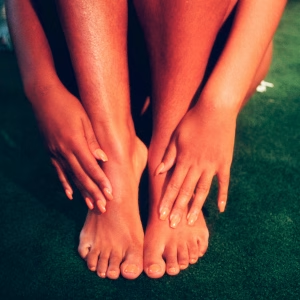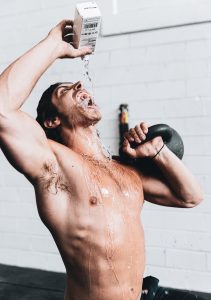Skin
What do Gout, Varicose Veins, & Neuropathy Have in Common?

What do neuropathy, gout, and varicose veins have in common? In western medicine not much, aside from being awful inconveniences, ranging from sources of extreme pain to discomfort and/or a significant cosmetic preoccupation.
For neuropathy you go to the neurologist, for gout to the rheumatologist, and for varicose veins you might see your primary care, who will likely refer you to a vein specialist. The neurologist may or may not inquire about venous circulation, and it is very unlikely the rheumatologist will ask about numbness or tingling in your feet.
But from a Chinese medical perspective, all of these conditions fall under the heading of impaired circulation in the lower extremities, caused by either weakness, inflammation, or both, leading to a misdistribution of bodily fluids, which exacerbates the former, which exacerbates the latter, and so on.
They are different in specifics only as a result of individual genetic proclivities—in fundamental mechanism they are the same. Someone with a colder bodily constitution—prone more to hypothyroid or hypotension, will be more susceptible to varicosities, whereas people with warmer body types—prone more to hyperthyroid or hypertension, will be more susceptible to gouty arthritis. The former are well advised to eat plenty of lamb and red meat, while the latter might consider being mostly vegetarian.
Neuropathies can go either way in the way of temperature, as they are more telling of issues with fluid metabolism. We find that neuropathy patients are either unusually thirsty, unusually not thirsty, or they urinate excessively or not enough. In either case, their body is clearly weakened to some degree, and it is imperative they get to sleep by 11pm, so nerves can properly regenerate.
While inadequate urination obviously leads to fluid retention which can clog neurological pathways and impair circulation, excessive urination can dry vessels of their healthy synovial fluids, causing us to feel parts of our body we previously took for granted as being unaware of.
Holistic medicine should modulate the organ function that is causing the improper excretion of fluids in addition to treating local blockages causing pain or discomfort. Easier said than done of course, as such conditions generally took many years to form, plus might be aggravated by present challenges, such as diet, stress, or medications being used to treat other conditions. However, through a course of treatment of acupuncture, herbal medicines, and dietary modifications, one should see improvement over a proper course of treatment, 120 days.
Please be discerning in your choice of clinician. If you see someone—whether east or west—who is failing to assess or treat beyond the immediate site of pain or discomfort, I would highly recommend getting a second opinion.
Thirst, Sweat, & Urine: What is Normal?

In contrast to the requisite ruling out of red flags by most nurses in conventional medical settings, the reason Chinese Medical practitioners ask about almost every system in your body is because we are diagnosing based on complete patterns—not just symptoms.
For example, if someone comes in for acid reflux, we cannot know their prescriptions until we know how often they urinate or poop, what each one is like, whether they experience headaches or dizziness, which part of the head they get their headaches in, how is their appetite, how thirsty they are during the day versus in the evening, etc. etc. This is because we are one of the only true forms of holistic medicine.
So, what is normal?
A normal amount of urination is approximately 6 times a day (yes, this includes waking at night). Much less than that and you are likely either retaining, or not drinking enough water in the first place. More than 6 indicates either a weakness in the urogenital microbiome, or excessive inflammation in the urogenital microbiome, which over time can lead to local weakness by putting strain on it. The remainder of the intake questions will determine which of the two is the case.
People should sweat, but not excessively so. Chinese Medicine is critical of HIIT or marathon training, hot yoga, and sauna therapy in most cases. While these might all feel great in the short-term and/or be proven to offer certain isolated benefits in the short-term, we believe they ultimately deplete the body’s healthy metabolic fluids. On the other hand, never sweating (exercising) at all is obviously just as harmful.
While some people barely break a sweat even when they exercise, others are drenched by the time they finish their morning commute, especially triggered by certain climates or seasons. The former can either indicate body fluid depletion or a malfunction of the immunological “qi.” The latter can either indicate inflammation, fluid retention, or also a malfunction of the immunological “qi.” This is where diagnoses and prescriptions get tricky.
Many western doctors have now begun to recognize the health benefits of the Chinese herb, astragalus, which on one hand is great. On the other hand, their recognition by way of empirical studies poses the challenge of having no comprehension of Chinese Medicine. If you give astragalus to the former example of a “cold-body person” with a simple immunological malfunction they will feel amazing and sing your praises. If you give it to someone with both immunological malfunction AND fluid deficiency it will do almost nothing. Worse, if you give it to a “hot-body person” with inflammation and fluid retention they will feel much worse.
Finally, it is normal to be thirsty, for 6-9 cups of water per day. A lack of thirst tells us there is fluid retention in the microbiome, signaling to the brain that it’s got plenty of liquid down here—no need to hydrate! This is dangerous, and better to fake it ‘til you make it in acquiring thirst. On the other pole are those who are ravenously or insatiably thirsty, which informs us of inflammatory heat in either their respiratory microbiome, gastrointestinal microbiome, or both, drying out their fluids. As always, the most complicated patterns are those who are generally unthirsty followed by sudden bouts of desperate thirst. This is a combination pattern that requires more thought, trial, and error.
I hope this was interesting and informative. One of western medicine’s shortcomings is its reliance on tests and labs to determine whether we are healthy or normal. While these are undeniably valuable, they tell only part of the story, which is why so many diseases get caught too late. Chinese Medicine is more brilliant in its neurotic recognition of pathologies in any abnormality, any imbalance, as something to rectify before it spirals into disease.
Acupuncture & Skin Conditions
Got Acne, Eczema or Psoriasis? Acupuncture Can Help
Our skin is our most visible organ and can often be the first thing people notice about us. If you suffer from a severe case of acne, eczema, or psoriasis, your skin care is the most important thing you think about. Over-the-counter medicine is a common first line of defense, but often the side effects are worse than the issue they are supposed to treat. continue reading



